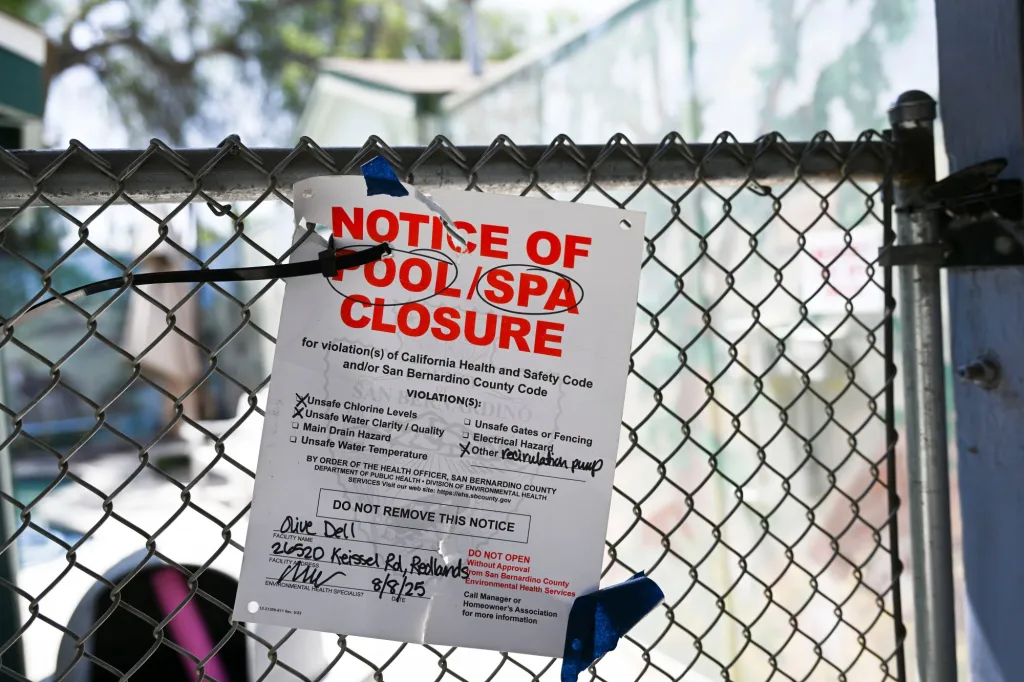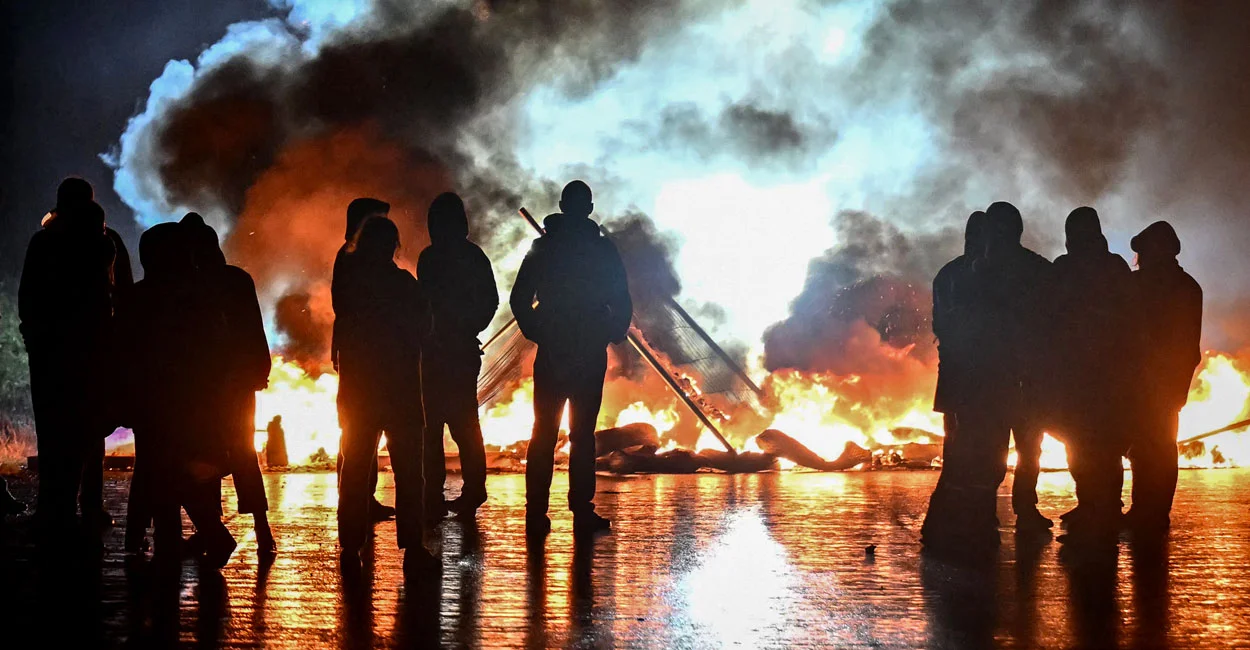Residents of a California nudist ranch – known for a double killing – say the owners are forcing them to wear clothes, move out

When the police officers and their battering rams, the deputy coroners and their bags of body parts, and the swarms of media with their notebooks and cameras finally left the Olive Dell Nudist Ranch in Redlands following the slaying and dismemberment of an elderly couple and the arrest of their neighbor in August 2024, the 100-some residents hoped their peace would return.
Instead, as has been laid bare in a lawsuit against the owners and operators of the site, the problems that had festered before the slaying of Daniel and Stephanie Menard and their dog, Cuddles, only worsened, a lawsuit filed in Superior Court in San Bernardino alleges.
RELATED: Missing elderly couple and their pet at California nudist resort were killed over a hot dog
Olive Dell, nestled into a hilltop above Reche Canyon and its wild burros, is dotted with RVs, mobile homes and colorful “birdhouse” rental mini-cabins on 136 acres.
The 56 plaintiffs say management has unfairly changed rules, allowed facilities to deteriorate, billed them for arbitrary fees, gouged them on electricity and eliminated amenities, all with the intent to drive them out so the owners can charge new tenants higher rents.
“All roads lead to money,” one of the residents’ attorneys, Nima Farahani, said in an interview. “People who have lived there a long time don’t pay much. This is not just a community to them but a characteristic of them and how they choose to live.”
Surprisingly, the least of the residents’ complaints, several told a reporter during a recent visit, is a dramatic change to that lifestyle: The landlords ordered them to put on clothes.
Tina Coffelt and co-defendants Mark Glasier and Brian Cleland, none of whom live at Olive Dell, purchased the ranch in 2019. They renamed it Olive Dell RV Park and Resort, although it’s still known to many as Olive Dell Nudist Ranch. The name change was a maneuver that would allow the owners to get around California Mobilehome Residency Law regulations that require a legal reason for eviction and govern rental agreements, park rules and fees, the lawsuit says.
Coffelt said in an unrelated court filing that the ranch was founded in 1952 as an RV park, not a mobile home park. Resident Sunshine Lorick, a plaintiff in the lawsuit, said there are currently 27 RVs and trailers and seven mobile homes.
“However,” the lawsuit says, “the ranch is still a mobile home park as defined by law, notwithstanding the rebranding.”
The lawsuit asks for financial compensation for the plaintiffs in various amounts, including $50,000, $100,000 and $250,000, depending on how they allegedly were damaged.
The defendants’ attorney, Steve Aaronoff, said in a response to the lawsuit he filed that the evidence presented was insufficient and that the case should be dismissed.
As recently as 2024, before an exodus of frustrated residents, there were about 80 residential dwellings, said Lorick, who used to work for Coffelt and read the electricity meters. Tenants pay $600-$1,300 each month to put down their mobile homes or RVs. Amenities include — or used to include — a pool, sauna, jacuzzi, restaurant and laundry room.
The residents bonded at events such as a Rock the Ranch concert, karaoke, barbecues, 5K nude run, Pirate Week, Pride Week and other events.
“The nudist community as a whole, it’s a huge family,” said Lorick, 47. “Everybody is caring. Everybody is considerate of each other.”
Said Erik Perosky, 55, who along with his wife recently became full-time residents: “This place is a little slice of heaven. It’s relaxing and you get to know people for who they are, not how they are dressed.”
But that lifestyle was challenged when, according to the lawsuit, on Nov. 4, 2024, Olive Dell owners sent a letter to residents that said in part, “After careful deliberation, Olive Dell RV Park and Resort has reached a decision to become a ‘textile’ park. Clothing will be mandatory at all times at all ‘common areas.’ “
The letter did not explain the decision. Coffelt has referred to nudists as “nasty people” and attempted to remove them from Olive Dell, the lawsuit says.
Some residents say they are ignoring the order.
Perosky, a retired Marine who said he served during Operation Desert Storm, gave a two-finger response — and they weren’t his thumbs — when asked his opinion of the restriction. He wore a loose wrap around his waist as he sat by the pool while his wife of 26 years, Crystina, 54, came to the pool area topless, defying the new restriction.
But the residents say they are more focused on the maintenance and what they say are questionable charges. No one is swimming in the pool because the water has turned green. The laundry room, sauna and jacuzzi were closed or not maintained. The owners canceled the events that Lorick said the residents put on themselves. She said she’s puzzled by the cancellations because the owners received a portion of the proceeds.
The lawsuit says management has removed several residents’ electricity meters. Some residents allege their bills have doubled or tripled. One resident was charged $140 even though they unplugged during a vacation, the lawsuit alleges.
When one resident questioned Coffelt about an unusually high bill, she responded with “Pay it or get out!” the lawsuit says.
The lawsuit also says Coffelt would end text messages responding to complaints with “and if you don’t like it, just move, or I’ll evict you.”
Said Erik Perosky: “Just dealing with the management is a major trigger for my PTSD.”
Redlands police have responded to Olive Dell several times for what police spokesman Carl Baker said were civil disputes.
This is at least the second lawsuit against the owners. In June 2024, mobile home occupants Wayne and Sandy Marinelli alleged retaliatory eviction and said the owners violated mobile home park residency laws by raising rents without proper notice and charging a security fee. Several other residents filed declarations about the situation in support.
In a court filing by Coffelt, she said converting the facility to a mobile home park would involve “enormous” construction work and other actions to meet permitting requirements.
Coffelt wrote that the Marinellis were on a “crusade to take control of the ranch.”
The status of that lawsuit was unclear on Tuesday.



